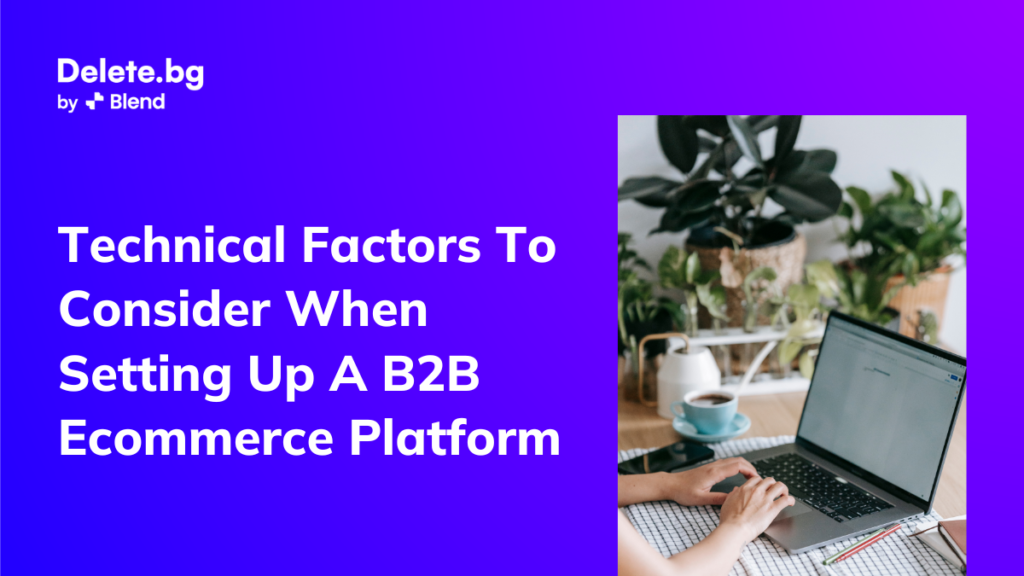E-commerce portals are at the center when it comes to shopping, especially for B2C transactions. Online shopping has grown remarkably and people prefer shopping in the comfort of their homes rather than going outside and visiting 10 shops. Further, players in the e-commerce segment have increased and multiple e-commerce portals are competing with each other.
However, e-commerce is not only limited to B2C. Many B2B e-commerce platforms are redefining the way people do business. What is B2B e-commerce? How can you select an ideal B2B e-commerce platform? Let’s find out!
B2B E-commerce Platforms

What people do in online shopping is B2C e-commerce i.e., businesses sell their products and services to customers. However, when e-commerce transactions happen between two or more businesses, then it’s a B2B e-commerce transaction. It normally includes an online sales portal and the selling of online products and services. B2B is a bit more complex as compared to B2C e-commerce. This is primarily because B2B e-commerce involves multiple variable factors like big businesses, huge quantities, complicated shipping, etc.
If you are a business and want to sell online, then firstly, you need to select an online B2B e-commerce platform. However, what are the factors that you should keep in mind while selecting an ideal e-commerce platform?
Factors to Keep in Mind While Selecting a B2B Ecommerce Platform
If you are a business and selecting an ideal e-commerce platform for selling your goods and services, then you should keep in mind the following factors:
- Cost: Different e-commerce platforms involve different costs. A hosted e-commerce platform will likely cost you more than a cloud-based platform. You will have to pay for the software cost, installation charges, storage costs, developer’s costs, server hosting, maintenance, etc. For a cloud-based platform, you will just have to pay a fixed amount, probably monthly fees, for security, hosting, support and maintenance.
These probably come out lower than the on-premises platform. Further, there is less hassle on the maintenance and operation part because that is taken care of by the service provider. Therefore, you need to consider your budget before selecting any of the e-commerce platforms. - Scalability: Is your e-commerce platform scalable? You certainly need an e-commerce platform that scales as your business scales. Presently, it might be the situation that your online store is not experiencing much traffic. However, this won’t be forever. Therefore, you need an infrastructure in place that can handle the traffic that your business attracts and scale with the increased requirements. Further, it should be efficient enough to maintain maximum performance and speed during peak periods.
- Technical Support: Technical problems can occur out of the blue. Swift and prompt technical support are important when you are dealing with an online e-commerce platform. The more downtime, the more business you lose. Therefore, evaluate the technical support of the e-commerce platform before selecting one. Nothing’s worse than waiting for hours or even days to get things normal.
- ERP Integration: You would certainly be using an Enterprise Resource Planning (ERP) solution. Can your e-commerce platform integrate with an existing business? If you are a business with multiple products, offerings, and SKUs, then it wouldn’t be possible to track your inventory without implementing an ERP system. ERP allows businesses to manage their day-to-day operations effectively from human resources, and inventory to accounting. It offers a complete back-end solution for your business. If the e-commerce platform can be integrated with the ERP system, then it will reduce your work burden to a significant extent.
For instance, suppose a customer buys something from your web store. The transaction will be forwarded to the ERP system where it will record the same, generate an invoice, and update your accounts and inventory as well as the customer data. This will also ensure that the transactions are error-free and accounts are synchronized. Further, you would be relieved to manually enter the transactions in your ERP system especially when there are thousands of such transactions. - PCI Security: The e-commerce platform must maintain adequate standards of security. After the customer makes purchases, they usually prefer online payments and disclose their credit card or debit card details. It is important to safeguard these details. Also, the data stored on your servers and system is susceptible to cyber-attacks. Any security breaches can have an adverse effect on your goodwill.
In the case of cloud-based platforms, the security services are provided by them as the data is stored on their servers. However, for hosted onsite platforms, usually, businesses are responsible for the security of the data. You need to ensure that all the PCI compliances are met and the payment gateways you engage meet the industry standards.
In a Nutshell
The B2B e-commerce platform you select will largely determine where your business is heading. It is one of the most important decisions for your business and therefore, you should keep in mind the above factors while selecting a B2B e-commerce platform.
Another important aspect is to display your products such that the customer gets tempted to buy your products and services. The images that you display on the e-commerce platform play a significant role in creating an impression in the customer’s mind. Therefore, you need to create professional product photos. Delete BG is a highly effective software to create professional product photos. It allows you to delete the background, remove the background, change the background and showcase your products with thousands of templates that support all the top e-commerce categories. How are you displaying your products?
The Delete BG API removes the background from product photos automatically and generates high-precision cutouts. The ML models that power Delete BG have been trained on more than 100,000,000 e-commerce images. To schedule a free consultation call, please email hello@blend.to.
